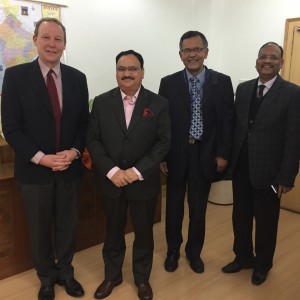Crucial talks took place yesterday (January 27th) in Dehli to highlight the plight of millions of people in India who die needlessly of fungal infection because of poor diagnosis and treatment.
Leaders from GAFFI, the Global Action Fund for Fungal Infections, met with India’s Health Minister JP Nadda, following talks with country representatives of the WHO’s South East Asian Regional Office (SEARO) and the Indian Council for Medical Research (ICMR) to call for a network of testing laboratories across India and trained clinical staff to help reduce unnecessary deaths.
The delegation, which included GAFFI’s President, Professor David Denning and Professor Arunaloke Chakrabrti who runs India’s reference laboratory for fungal diseases, are hopeful of success. At the meeting, the Health Minister declared: “ GAFFI’s bold attempt to define a clear pathway for improvements in care for patients with serious fungal disease is welcome. The Indian government is committed to improving healthcare for all its citizens and recognises that modest investment in this area will reap large health benefits.”
His comments were supported by Health Secretary Lov Varma and Additional Health Secretary CK Mishra.

Latest GAFFI statistics in India show the extent of the problem. For example:
• Fungal asthma (ABPA/SAFS) 1.5 million with ABPA (allergic bronchopulmonary aspergillosis, 1 million with SAFS (severe asthma with fungal sensitisation)
• Recurrent vaginal thrush in women – 23 million
• Chronic pulmonary aspergillosis after TB – 290,000
• Mucormycosis complicating diabetes and leukaemia – 170,000
• Fungal meningitis in AIDS (cryptococcal) – 18,400+
Professor Denning, who is Professor of Infectious Diseases in Global Health at the University of Manchester in the UK, says healthcare is improving in India and, as it does, the need for fungal diagnosis becomes even more acute. He explains: “There are too many unnecessary deaths because of inadequate testing capability and too much wasted antifungal therapy in hospitals on the wrong patients. There is a major need to build reference laboratories and train clinical staff – GAFFI’s focus is to get a mycology reference lab in each state, and surveillance reporting established in a network of labs across the country.”
Following talks with the Health Minister and Health Secretary, a follow up meeting was immediately convened by Dr Jagdish Prasad, Director General of the Health Service to discuss implementation with existing programs. Key public leaders of TB, non-communicable diseases and blindness programs agreed to develop national guidelines for chronic pulmonary aspergillosis with special reference to TB. All agreed that specific arrangements for future surveillance of fungal diseases, through a network of mycology laboratories, was seen as “highly desirable”. Reinforcing the efforts to combat fungal keratitis was also discussed.
Professor Arunaloke Chakrabarti who is Head of Medical Microbiology at the Postgraduate Institute of Medical Education and Research in Chandigarh adds: ‘Major strides forward in training in mycology are underway in India, but the provision of modern laboratories, funded to undertake diagnostics lags too far behind. Lack of diagnostics is hindering fungal outbreak control, reduction in risk for hospitalised patients, and causing excess expenditure on unnecessary treatments. Diabetes and asthma are rife in India and these lead to huge numbers of affected patients.’